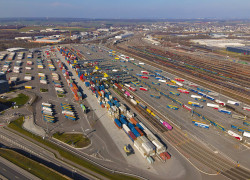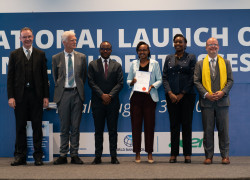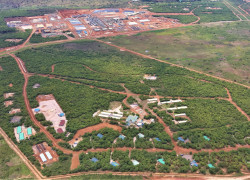Deloitte Luxembourg - The Solution Revolution
How business, government, and social enterprises are teaming up to solve society’s toughest problems
A quiet revolution is underway in how we solve society’s problems. This revolution is a world-wide multi-billion euro economy, operating between all sectors and has arisen to tackle problems from housing and obesity to low-cost education and even human trafficking
Tom Pfeiffer, Partner and Performance Audit Leader at Deloitte Luxembourg
Nowadays, healthcare, poverty, transportation and recycling are all challenges being addressed not only through government-only solutions but through the collaboration of public, private and nonprofit sectors. From malaria in Africa to traffic congestion in California and respectively Luxembourg, ‘The Solution Revolution: How Business, Government, and Social Enterprises Are Teaming Up To Solve Society’s Toughest Problems’ by Deloitte’s William Eggers and Paul Macmillan explore how public and private sectors are converging to solve today’s most urgent social problems.
Where tough societal problems persist, new problem solvers are crowd funding, ride-sharing, app-developing or impact-investing to design innovative new solutions. Where societal problems arise, markets are forming around them and incentives are driving a diverse breed of new social innovators who trade solutions instead of dollars to fill the gap between what governments can provide and what citizens need.
“A quiet revolution is underway in how we solve society’s problems. This revolution is a world-wide multi-billion euro economy, operating between all sectors and has arisen to tackle problems from housing and obesity to low-cost education and even human trafficking.” explains Tom Pfeiffer, Partner and Performance Audit Leader at Deloitte Luxembourg. “We have observed this Solution Revolution trend within Luxembourg, as we have received a growing number of requests to inform governments and public bodies about the efficiency and effectiveness of government spending. Our goal is to provide assurance that resources have been or will be used the best way possible with regard to economy, efficiency and effectiveness, as well as according to the objectives and impacts that have been planned.”
The Solution Revolution details how disruptive technologies like analytics, social media, mobile phones and cloud computing enable the development of new business models and the rapid mobilisation of massive resources around big challenges. Combined with impact currencies, which serve as a mean of paying for social impacts in addition to new exchanges that connect capital of all types to societal problems and a completely new way of solving public problems is formed.
It seems that no challenge cannot be solved by the Solution Revolution, a concept where individuals and organisations are beginning to collaborate and take social matters into their own hands. Consider these examples:
- Ridesharing app companies like Karzoo benefit city governments and residents alike by creating exchanges for citizens to trade unused car seats as assets. Acting as a digital impact currency, they exchange rides, profits and public outcomes between citizens, the city and the company.
- LivingGoods, abates poverty in Africa with a micro-franchise model for social ends. They equip female sales agents with a readymade franchise business for selling everything from malaria medicine to cookstoves. The result is more self-employment and access to essentials.
- Unilever, which went beyond CSR to partner with NGOs banks and governments to sell cleaning products in rural India where sanitation is an urgent public problem.
- The Indian government launched a €740 million fund to spur private sector solutions to social problems.
These amongst many other examples around the world show how the Solution Economy is creating new ecosystems, exchanges and currencies. “The Solution Revolution is creating new forms of economic organisation and shifting problem-solving away from a government-only model. The results are better, the innovations are smarter and the costs are lower than government alone.” says Tom Pfeiffer.
ABOUT THE AUTHORS:
William D. Eggers is one of the U.S’s best-known authorities on government reform. He is the Global Research Director for Deloitte’s Public Sector practice, columnist and author of seven books. His writings have been published in numerous publications including the New York Times and Wall Street Journal. He lives in Washington, DC. Paul Macmillan is the Global Industry Leader for the Public Sector practice for Deloitte. He lives in Toronto.
ABOUT THE BOOK:
THE SOLUTION REVOLUTION
How Business, Government, and Social Enterprises Are Teaming Up To Solve Society’s Toughest Problems
By William D. Eggers and Paul MacMillan
Harvard Business Review Press
Publication date: September 17, 2013
$26 Hardcover Original; 304 pages; ISBN: 978-1422192191
More at www.solutionrevolutionbook.com
Communiqués liés
RSA launches technology and management liability insurance s...
RSA Luxembourg, part of Intact Insurance Specialty Solutions, today announces th...
Lancement d'une nouvelle connexion intermodale entre Bettemb...
CFL multimodal a le plaisir d'annoncer le lancement de sa nouvelle connexion i...
Experts from LUNEX award first micro-credentials in Rwanda o...
The Rwanda Ministry of Education (MINEDUC) formally inaugurated Syllabi, a publi...
ERG Notes that ENRC Secures Landmark Victory as Court of App...
Eurasian Resources Group (ERG), a leading diversified natural resources group he...
LetzToken et La Vie est Belle annoncent leur partenariat ouv...
«?LetzToken?», plateforme de tokenisation pionnière basée à Luxembourg, et ...
ERG announces a Pre-Export Finance Facility Agreement based ...
Eurasian Resources Group (“ERG”, “The Group”), a leading diversified nat...
Il n'y a aucun résultat pour votre recherche







